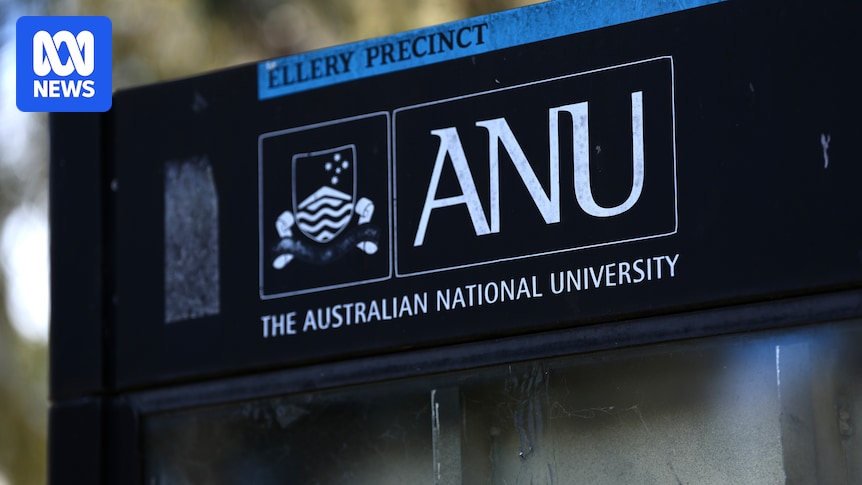The Australian National University (ANU) has abandoned its plans for forced redundancies as part of its efforts to cut costs.
Interim vice-chancellor Rebekah Brown told a town hall meeting of staff and students this morning that the university “no longer need[ed] any more involuntary redundancies”.
Five of 13 “change proposals” are still in a consultation phase, and forced redundancies identified as part of those plans will now not go ahead.
Professor Brown was temporarily placed in the role after Genevieve Bell bowed to pressure and resigned last week.
Professor Bell had been overseeing a suite of changes to try to save $250 million in operating costs.
Those changes included multiple rounds of redundancies and changes to departments, causing controversy across the university.
Union members supported a vote of no confidence against Professor Bell and chancellor Julie Bishop and have repeatedly called for their resignations.
Professor Rebekah Brown was installed as the interim vice-chancellor of the Australian National University. (ABC News: David Sciasci)
Today, Professor Brown announced there would be no further job cuts as part of the ‘Renew ANU’ process.
“Because of the budgetary repair we’ve been able to achieve in the aggregate, I’m really pleased to announce that the chancellor has supported that we no longer need any more involuntary redundancies,” she said.ANU vice-chancellor resigns after months of controversy
She also announced that the Australian National Dictionary Centre would now be preserved.
The centre was set to be closed as part of the restructure, but Professor Brown said it would remain open due to a philanthropic gift from an unnamed donor.
“I’m really pleased to advise today that an anonymous donor has offered a very generous philanthropic gift, made in honour of Bill Ramson and Joan Hughes, who established and were the editors of the first edition of the Australian National Dictionary.
“This gift will enable the Australian National Dictionary Centre to continue to operate over the next two years while the dean and myself and the dean’s leadership team will be working to secure alternative long-term funding.”
Professor Brown added that funds had also been “identified” that would be “reallocated to support the Australian Dictionary of Biography while it also seeks alternative funding”.
Future of School of Music remains unclear
The School of Music was to be absorbed into a new School of Creative and Cultural Practice. (ABC News: Callum Flinn)
The interim vice-chancellor said the university leadership was also having discussions about the future of the School of Music, in light of forced redundancies having been ruled out.
The ANU had previously said it would make significant changes to the school — absorbing it into a new School of Creative and Cultural Practice and discontinuing one-on-one instrument lessons.
“I want to say that the School of Music was always and will be an important and intrinsic part of our community and it was never proposed to be disestablished,” she said.
“I’m really pleased to say that the dean and myself and the dean’s leadership team are in dialogue with Canberra Symphony Orchestra, asking questions about our region, our social licence and the potential for developing a 10-year plan.”
In sharing this news, Professor Brown said: “Our partnerships and our relationships are crucial to who we are”.
Julie Bishop was appointed chancellor of the ANU in January 2020 after a career in federal politics. (ABC News: Matt Roberts)
Brown won’t ask Bishop to stand down as chancellor
Taking questions from those attending the town hall, Professor Brown acknowledged that she would have to “win” the trust of the ANU community after Professor Bell’s resignation.
She was asked whether she would “commit” to asking Ms Bishop to stand down as chancellor.
“The short answer is no — it’s not the interim or vice-chancellor’s prerogative to ask a chancellor or any member of council to step down,” she responded.
“That is a decision for council.”
But she said ANU leadership was focused on delivering “an outstanding student and staff experience” and would be offering increased on-site counselling on campus from next week.
Union claims ‘major victory’
In the wake of the town hall, the National Tertiary Education Union called the announcement to stop forced redundancies a “major victory”.
Academics, staff, politicians, and students previously rallied on the Australian National University campus to protest proposed jobs cuts. (ABC News: Ian Cutmore)
“Every university staff member in the country facing job cuts can take heart from what has happened at the ANU,” the union’s ACT division secretary Lachlan Clohesy said.
“It is the collective work of union members which has saved these jobs at the ANU. In doing so, they have stood up not just for their own jobs, but for the university itself.
“The interim vice-chancellor deserves credit for reading the room accurately on this issue. More consultation is needed on structural changes, but removing forced redundancies is a significant step forward.”

